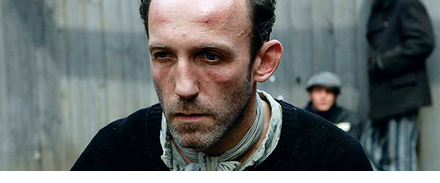 The story begins at an ending, of sorts.
The story begins at an ending, of sorts.
It’s post World War II Monte Carlo. And all of the penguin suits, baubles and baccarat tables can’t disguise the ambivalent, conflicted affect of the most successful man at the casino, a man who only months earlier was buried inside the Third Reich‘s nightmare.
“The Counterfeiters” centers on the plight of this Monaco gambler, Salomon “Sally” Sorowitsch, who before the war was a notorious Berlin counterfeiter who enjoyed all of the intoxicating largesse associated with a successful entrepreneur. He also appears to live by a narcissistic ethic, arguably not necessarily a bad thing when circumstances dictate that one must rely on their survival instinct. Played by the Austrian actor, Karl Markovics, who boasts an Easter Island face, Sally possesses a placid, blank visage which will serve him well as his life is unhinged.
The film moves abruptly from his arrest in 1936 to his internment in a concentration camp in 1944. It dispenses with obligatory court room scenes. Suddenly, bleakness envelopes “The Counterfeiters” as torture, murder and death are commonplace. Yet, from the onset of his internment, his artistic talent matched with a certain moral complacency affords him a special status. As Sally paints bucolic family portraits for German commanders he noshes on meats and breads. He doesn’t appear to have difficulty digesting his complicity.
But Sally’s criminal acumen makes him even more valuable to his captors and he is recruited to assist them in a devious matter requiring more than a lick of paint and a brushstroke. He is chosen to lead a team of prisoners who will manufacture a counterfeiting operation which the Nazis envision will become so immense that it unhinges the Allies’ economies. Sally appears only to be the only one of the rounded-up gang with a rap sheet as the others were wrenched from their law abiding professions when sent to the camps.
And while the film is set in a concentration camp, the prisoners assigned to the operation are relatively coddled. They are swaddled in comparative luxuriance: three daily squares; fresh linens on mattressed bunk beds; and well-appointed work stations.
From the onset of the operation, Sally is challenged by a young idealist, a fellow recruit named Burger (August Diehl), who becomes the conscience he must respond to or, at the very least, cannot ignore. Our humanity, Burger compellingly implies, is not a solitary notion but a responsibility to the collective. But is it?, Sally silently suggests. “One adapts or dies” is a mantra he abides by. What does Sally’s sentiment mean? Is it an aphorism, a Darwinian truth, a cynical summation of the human experience, a truism under all totalitarian regimes? A struggle between group identity and individual autonomy grips the film. What do we owe to a larger? Even an atheist can believe in the concept of something bigger than themselves. But do we have to? Does our very existence presuppose that we are joiners? So Sally, the ultimate deal maker, the proficient moral relativist, is asked to contemplate visceral, crucial questions which never troubled him as he was immersed in his Berlin lifestyle.
And then in the moments when the war is over, once a common evil is vanquished, we are witnesses to our most unsettling, most harrowing scene at the camp. It’s a scene which is all the more powerful because of the relative ordinary episodic storytelling style of the preceding scenes. And again unnerving questions are asked. Once a common evil is removed, how do those who remain deal with their anger, their rage, their pain? Do we lash out at those who were just seconds before our comrades?
Director Stefan Ruzowitzky has crafted an absorbing movie though one which doesn‘t fully reach magisterial heights because of the straight-forward style. So “The Counterfeiters,” which garnered the Best Foreign Language statuette earlier this year, is a film which doesn’t as much quicken the pulse as stimulates the cerebral. It puts one in a contemplative mood, prompting questions and promoting debate. And in the end that feels like a beginning, of sorts.
